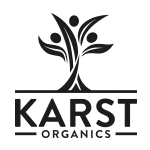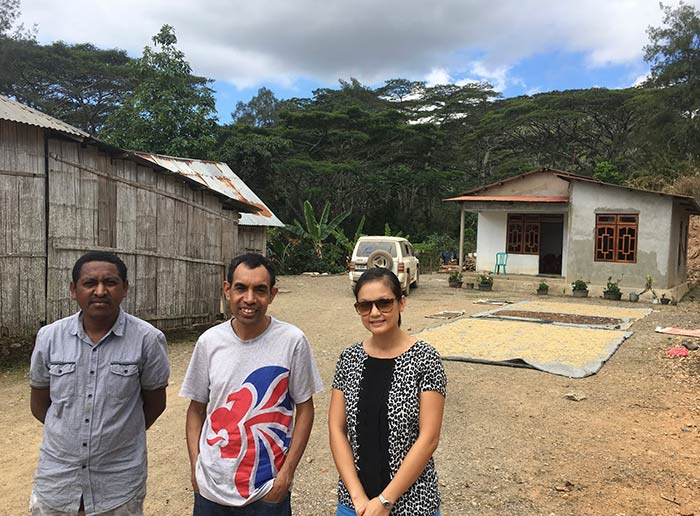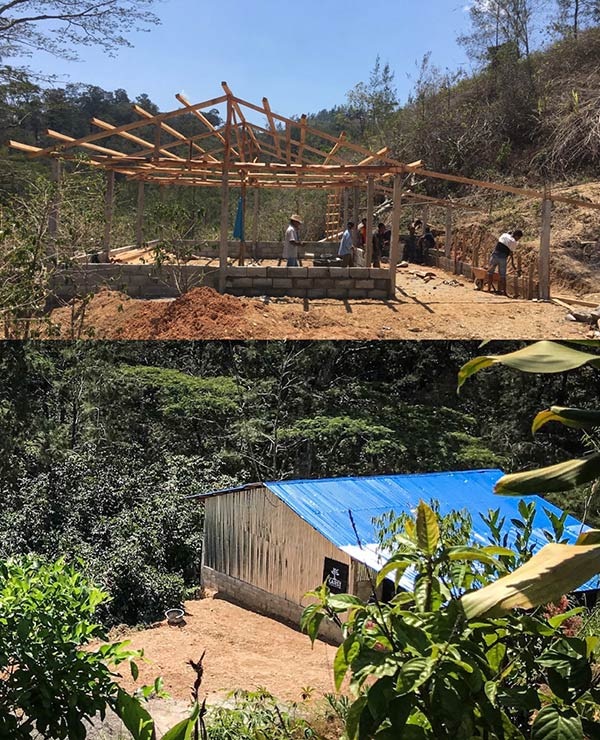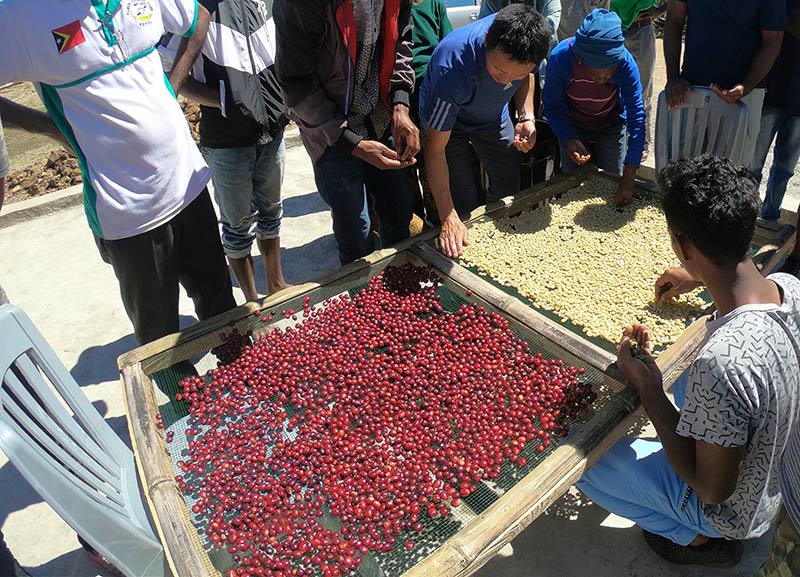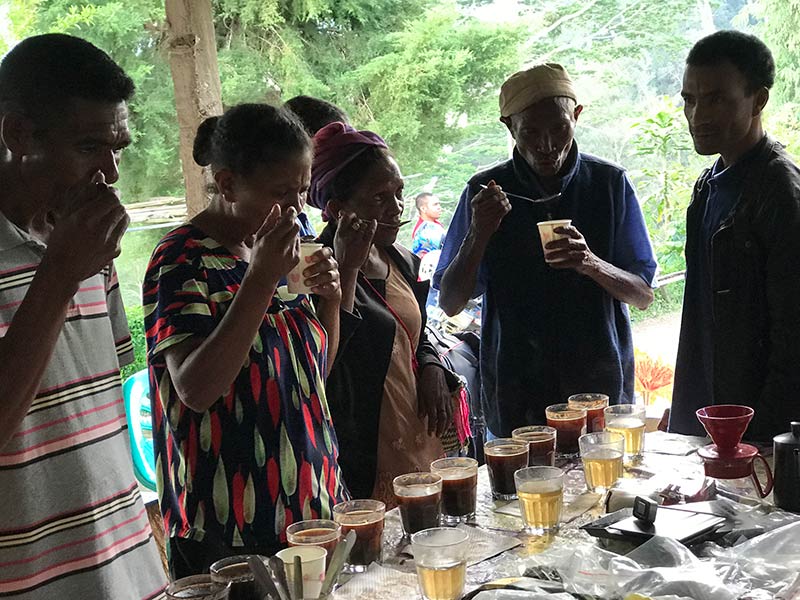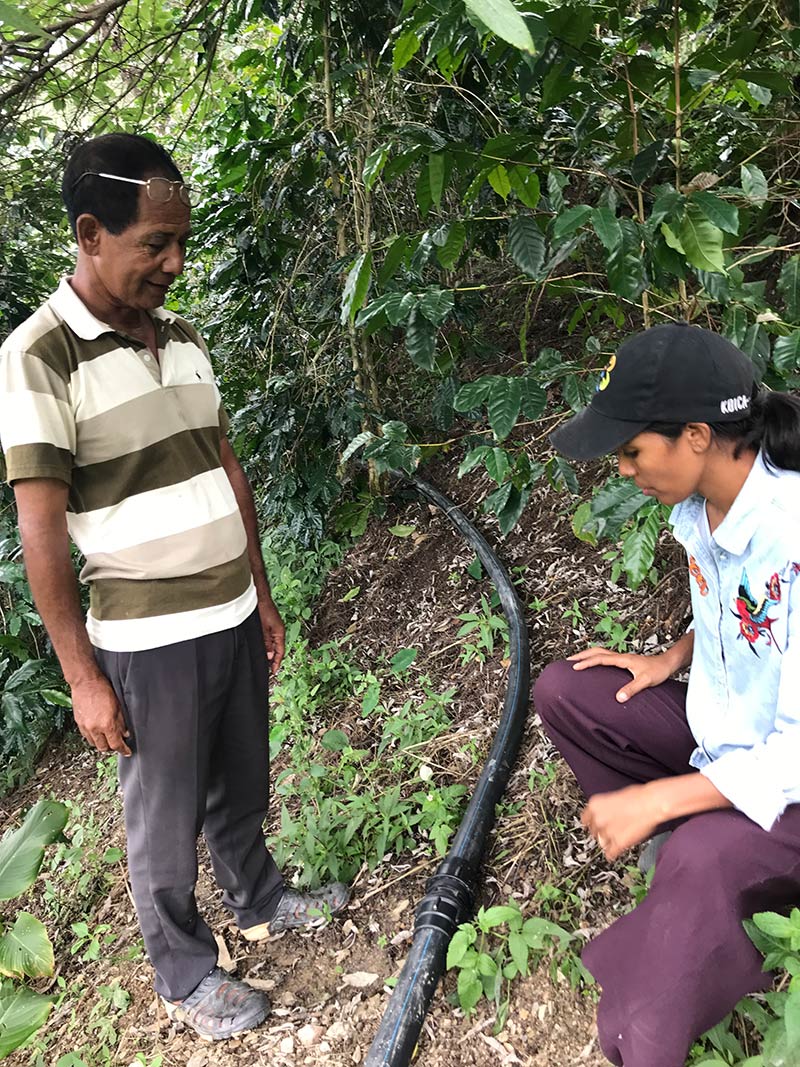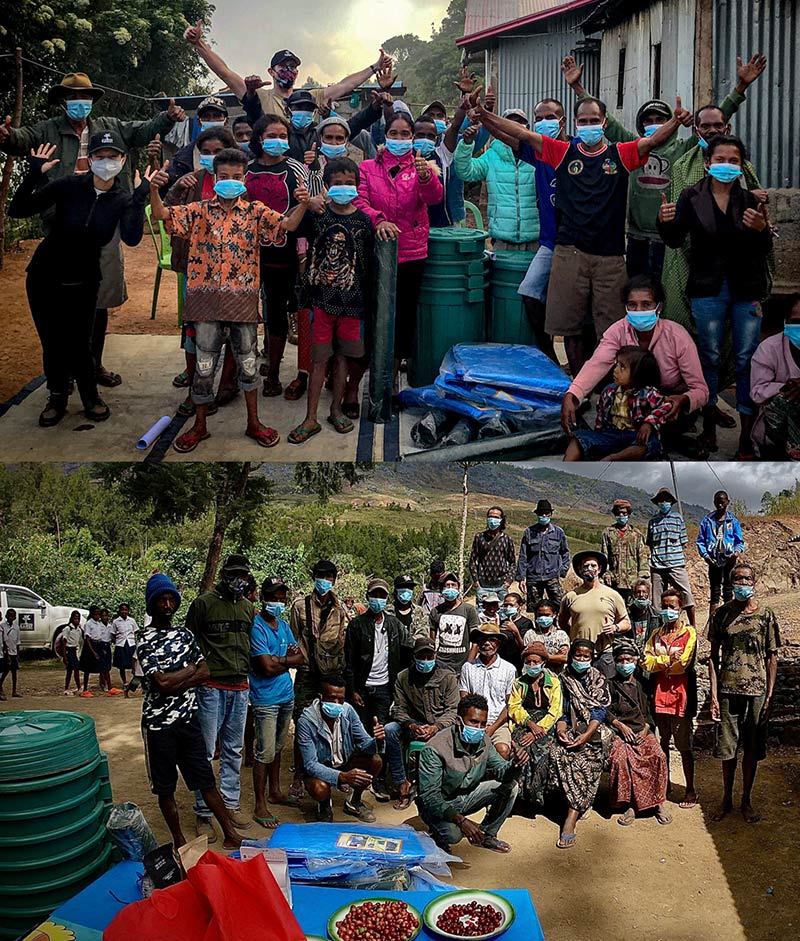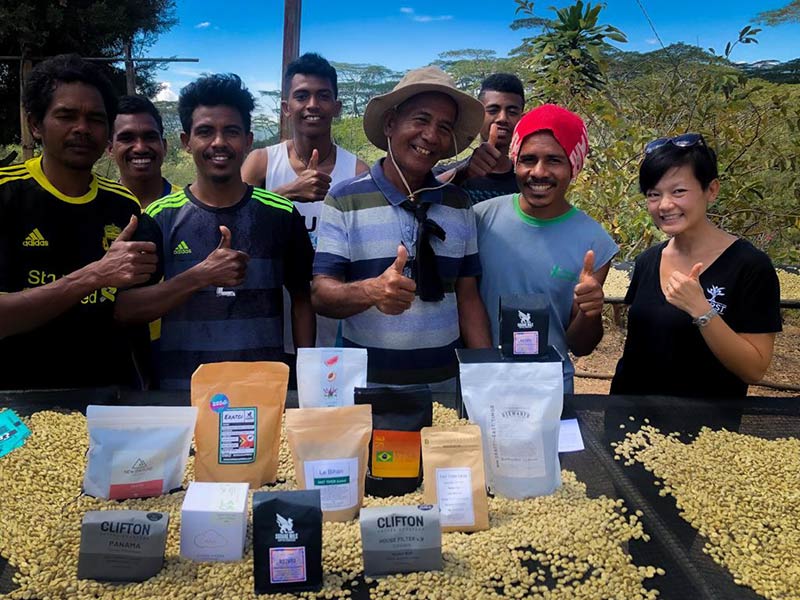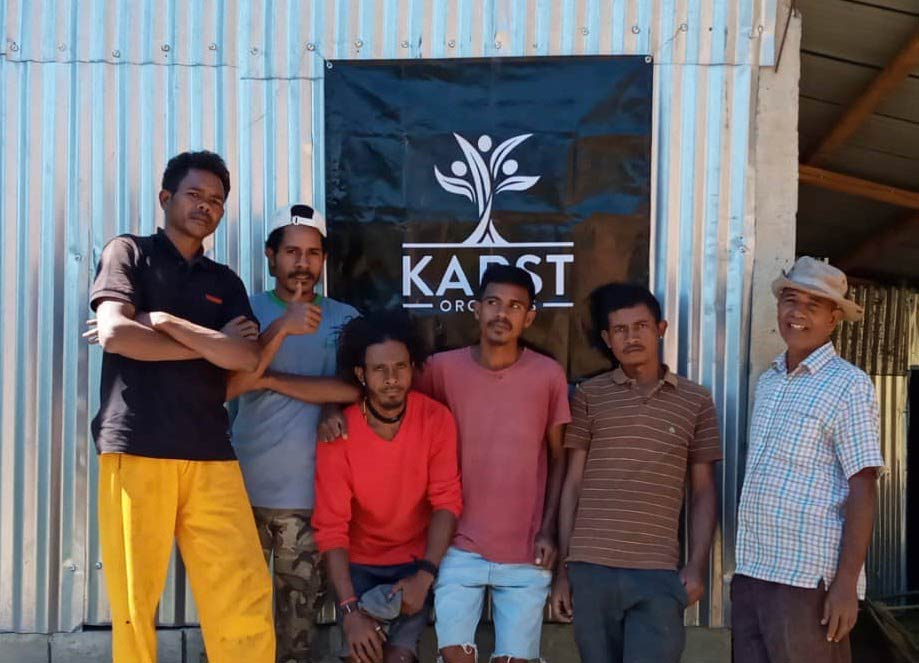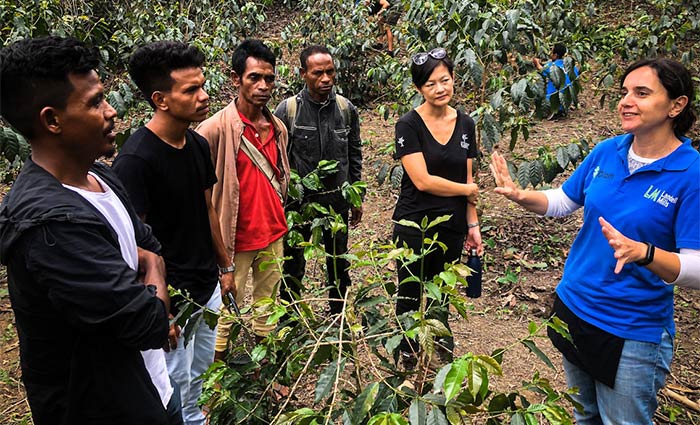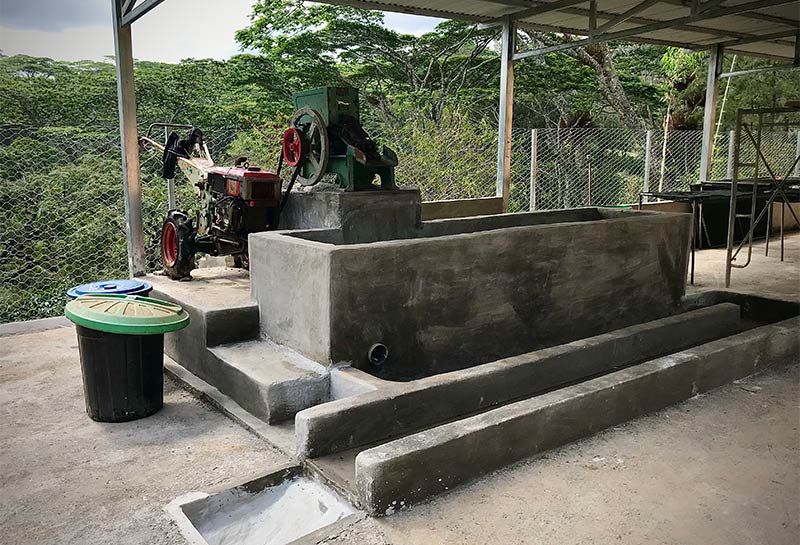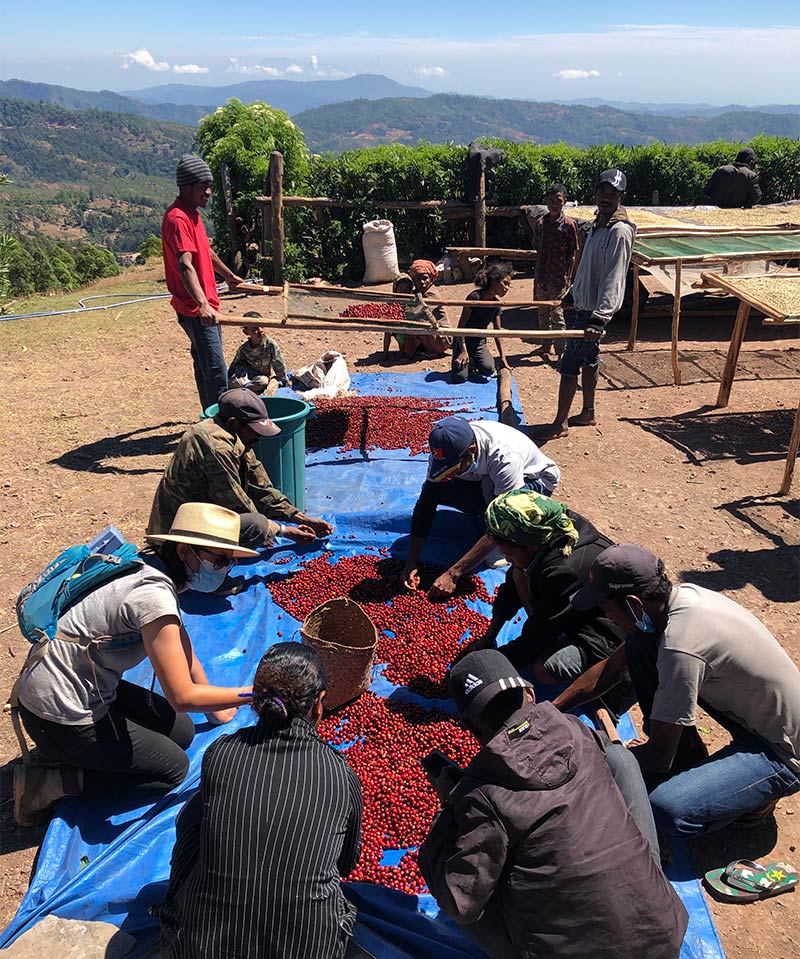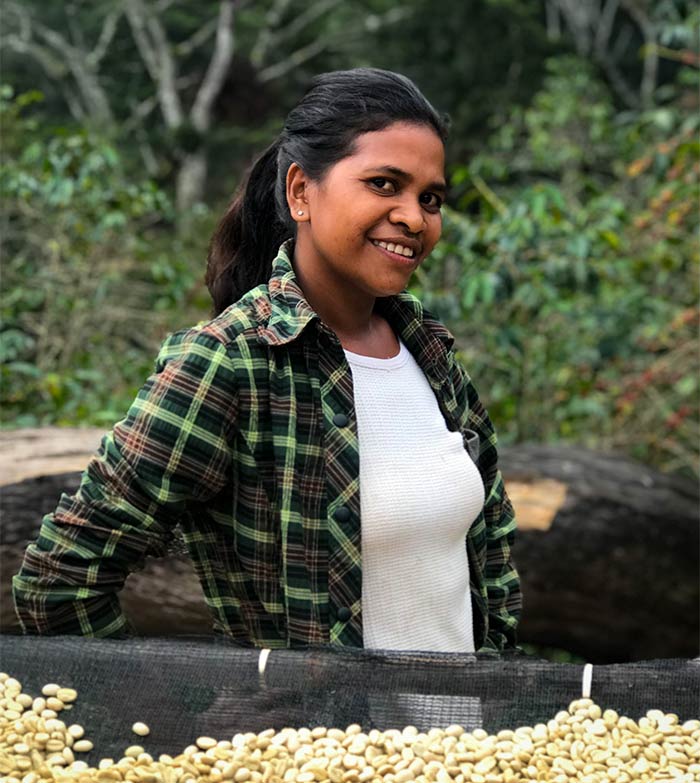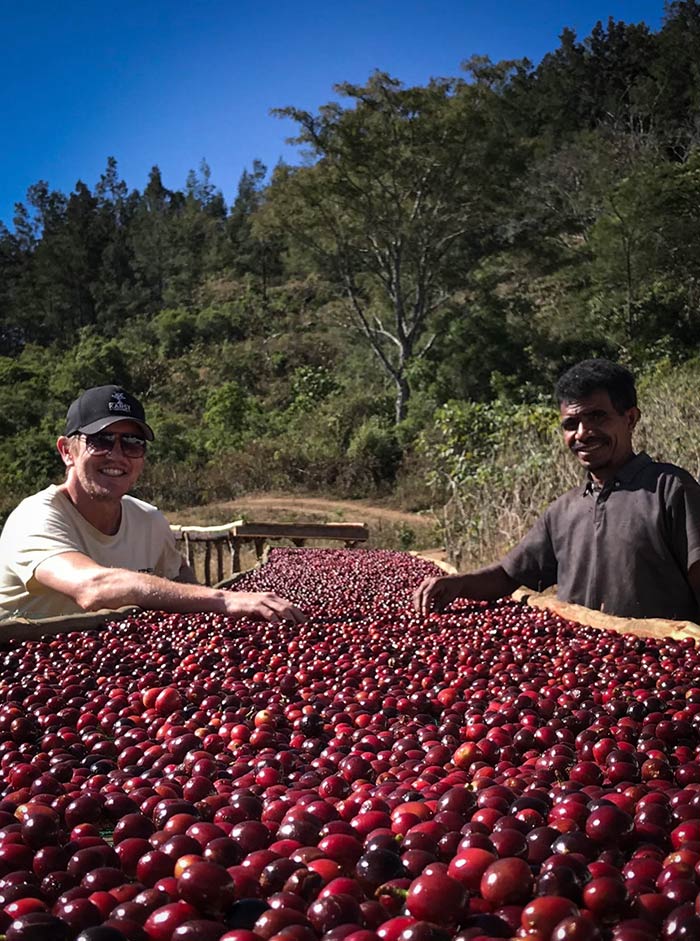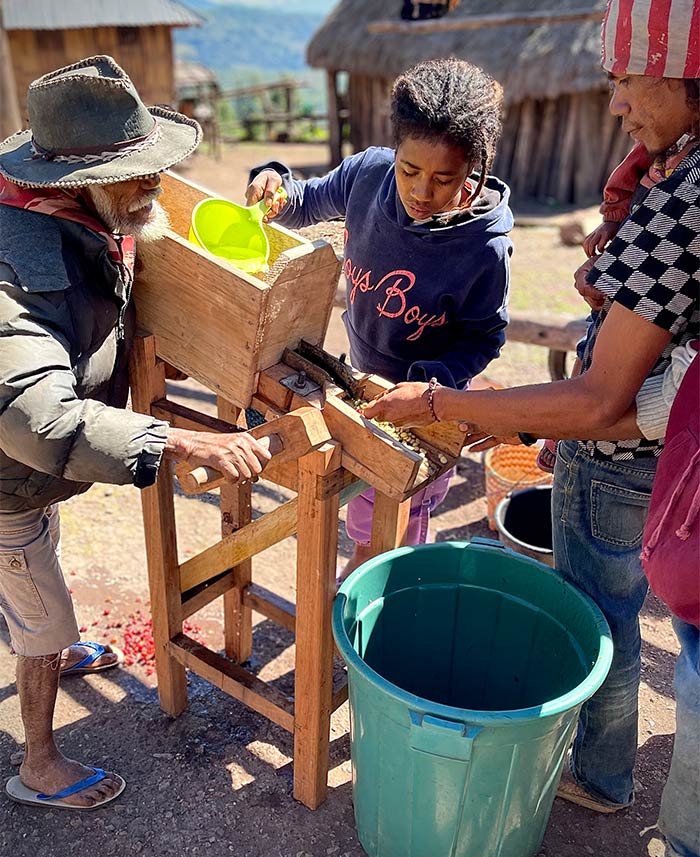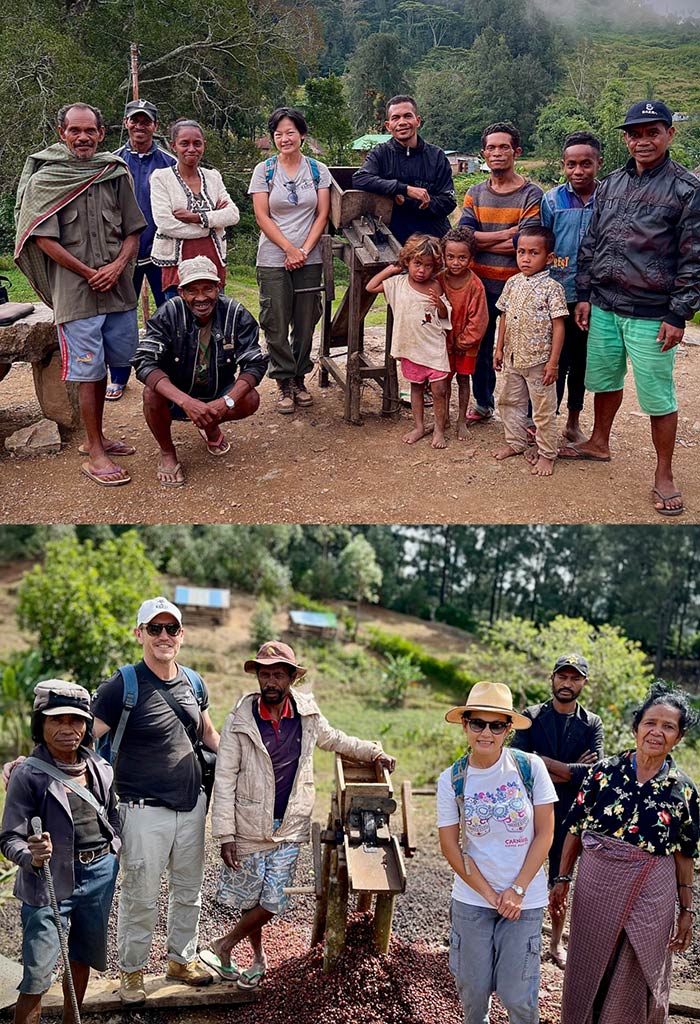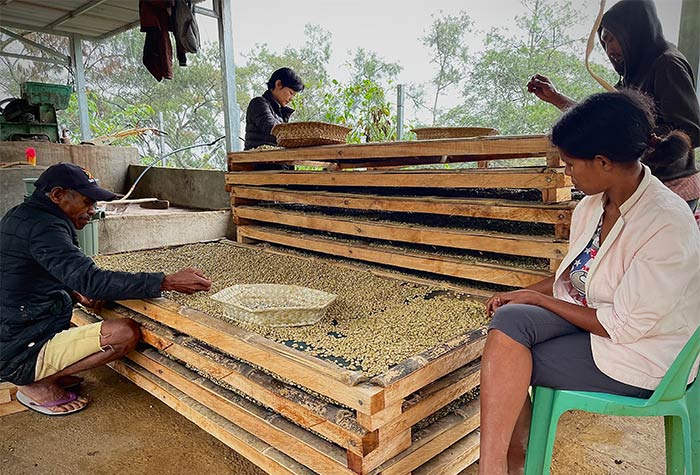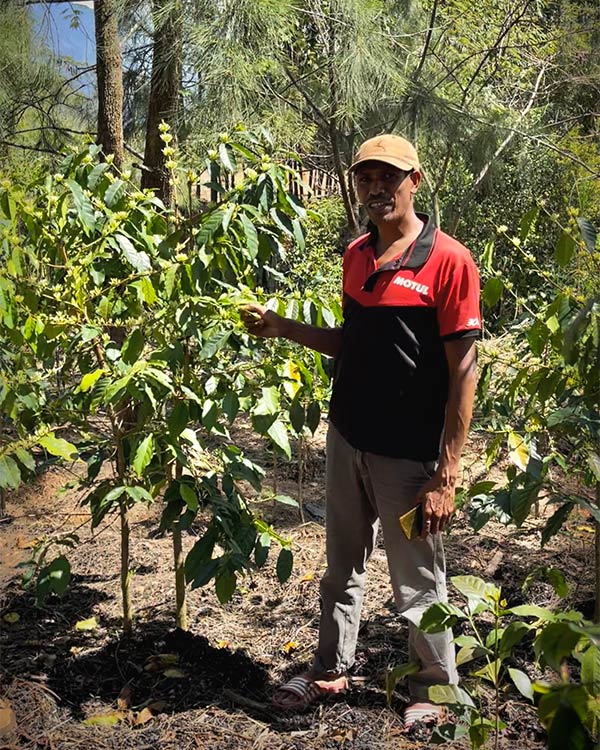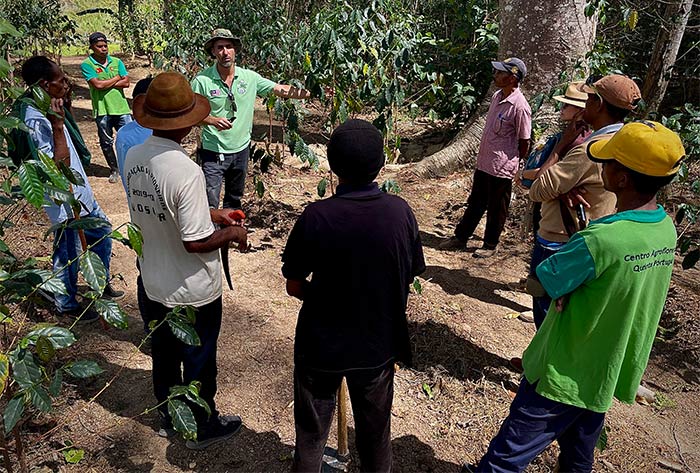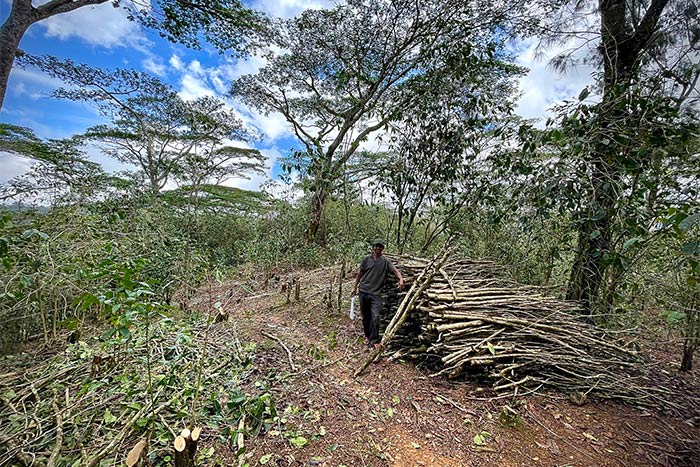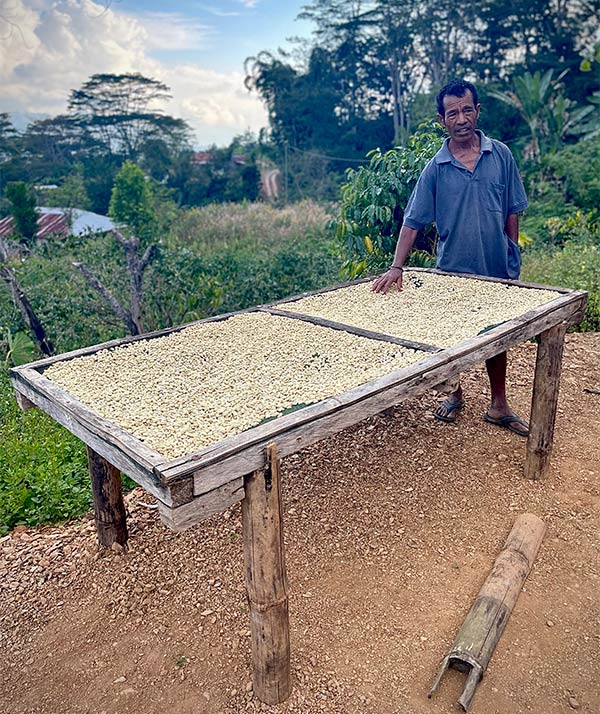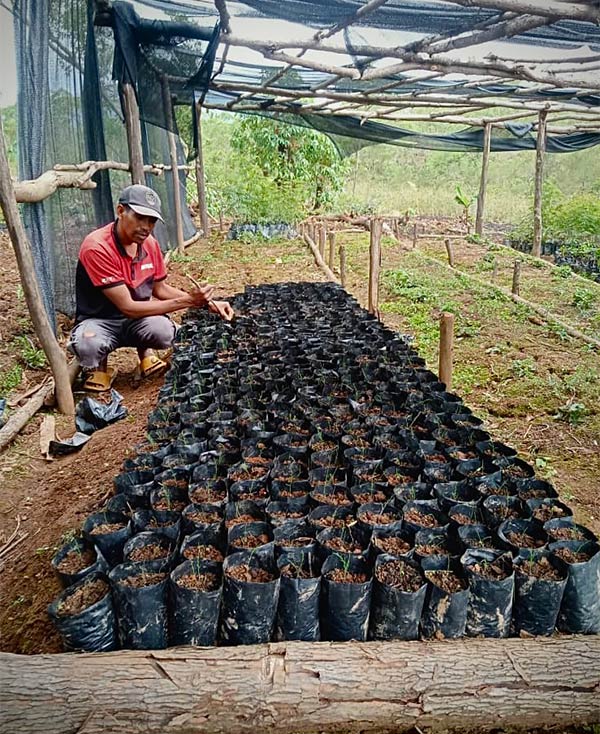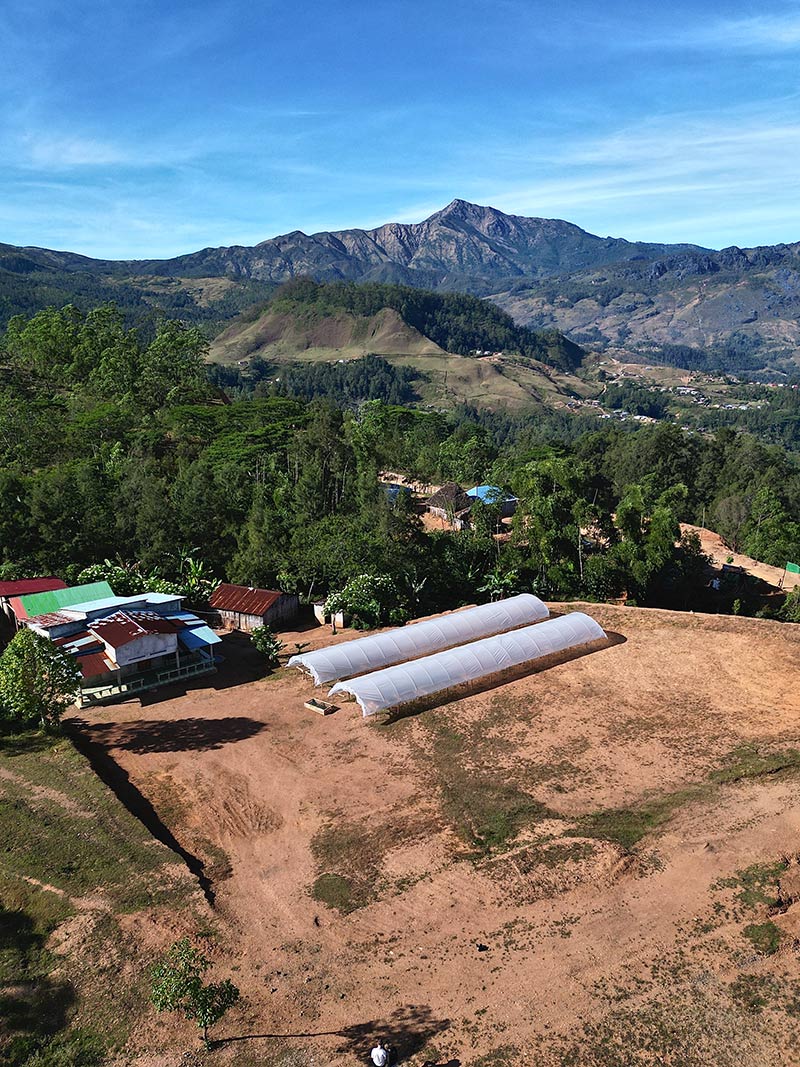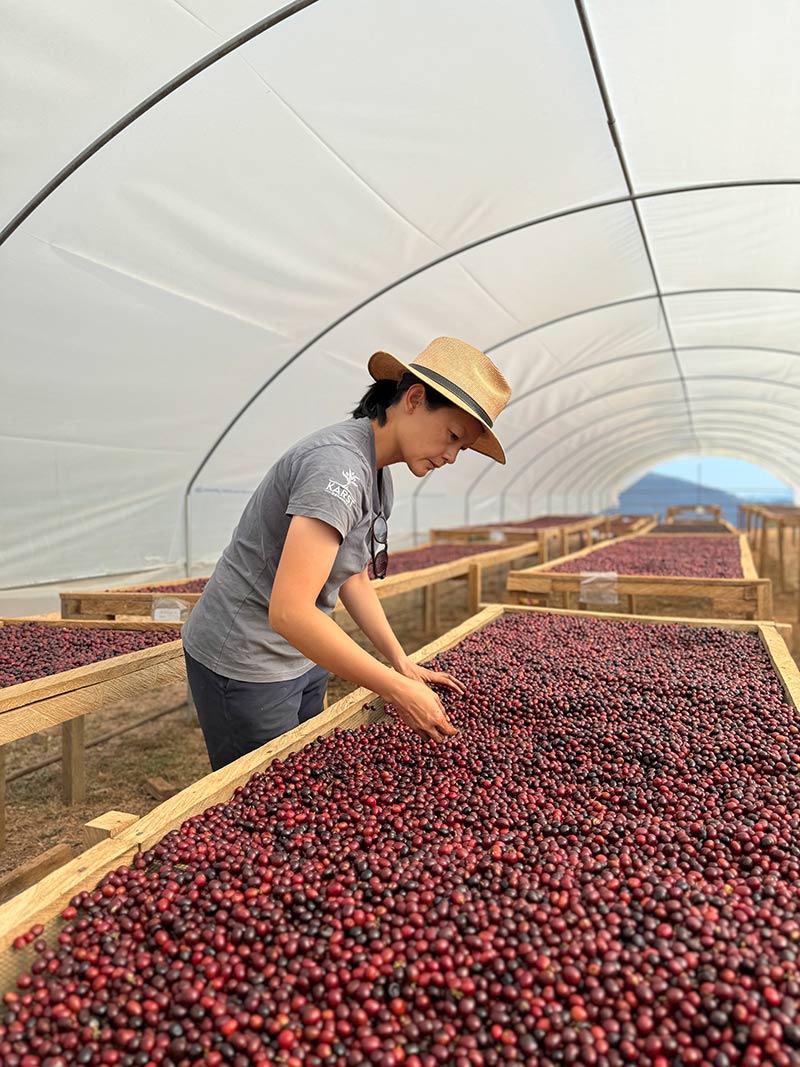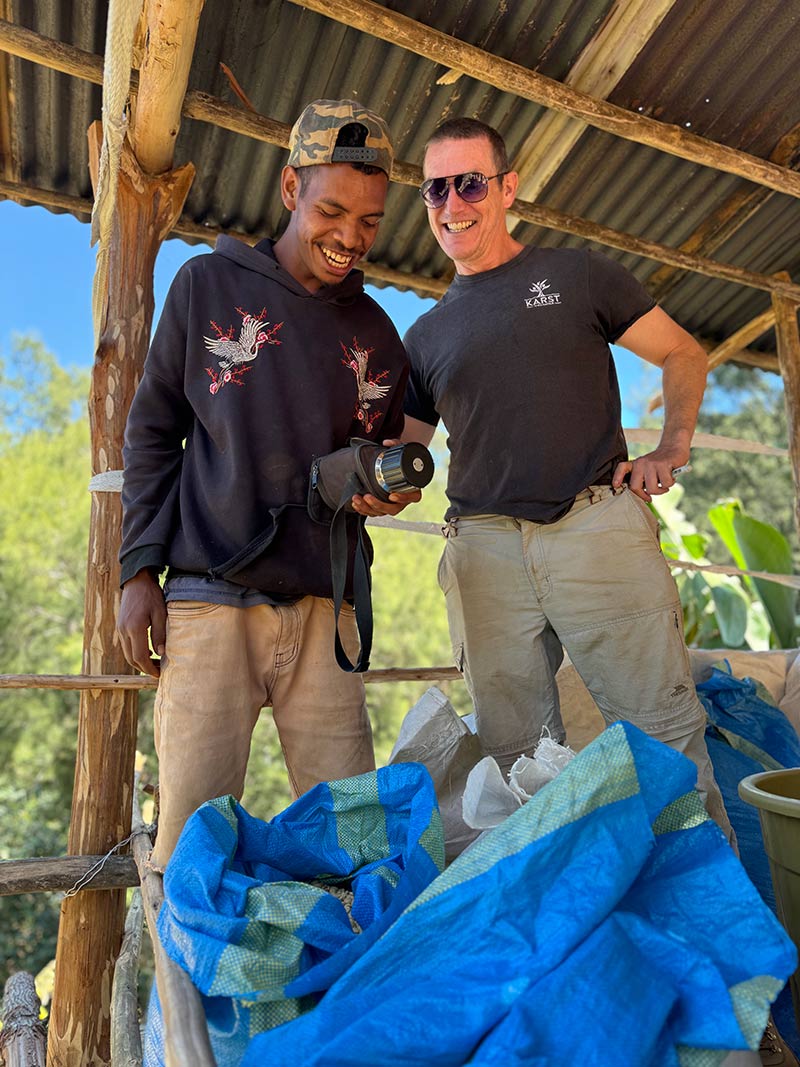OUR WORK AT ORIGIN
ELEVATE - INVEST - TRAININGKarst Organics was established with the following aims:
1: To elevate coffee quality so as to open up new opportunities within the international speciality sector.
2: To invest in people and provide employment in Letefoho’s coffee community where possible.
3: To offer access to training opportunities on rehabilitation activities to improve coffee tree quality and increase average yields.
This is how we have invested our time over the years and set out to try to achieve these aims.

2017: First trip to Letefoho
Our first visit to the coffee farms of Letefoho at the invitation of Antonio Soares (middle), Stewart’s then work colleague.
During our visit, we met with some coffee farmers who expressed their frustrations with commercial buyers and the low prices they were receiving year on year. As a result, we discussed whether there might be an opportunity to export their coffee to the UK following which we took some samples back for roasters to try. Initial feedback was positive but more work was needed on processing in order to realistically be considered for the speciality market.
2018: Initial investment at farm level
After entering into a partnership with our first 2 partner groups (Rotutu & Eratoi) and following advice from other green bean exporters, we funded the construction of a storage facility so that parchment could be stored in the most preferable conditions.
Investment was also made into the construction of our first ‘mini’ centralised processing facility at the request of those farmers in the community who wished to sell cherries.

2019: Training in processing & understanding speciality coffee
Prior to the start of the harvest in May 2019, we collaborated with the Associasaun Café Timor (ACT) to provide training programs around quality coffee processing. A strong emphasis during this training (and maintained to the current day) is the importance of harvesting only the ripest cherries to ensure optimum sweetness and the drying of parchment on raised beds to ensure more even drying on a cleaner and dust free surface.
During this time, we also provided coffee cupping sessions with the local community so as to have a better understanding of the expectations of roasters in the UK and how differing processing methods can affect cup profile.

In June of this year, we supported the installation of new water pipes to the mini centralised processing facility in Rotutu for greater consistency and reliability of water supply. This required 900m of new piping to be laid and also provided some homes within the local community access to a direct water source which they otherwise wouldn’t have had.

2020: Organic expansion of our partner groups
In 2020 we were invited to work with the communities of Cristo Liurai (top) and Hatuhei (bottom) who became our 3rd and 4th partner groups. These photos remind us of what an impossibly difficult year this was for everybody and we were very grateful for the Market Development Facility’s (MDF) support in sponsoring us as an essential worker so we could return to Timor-Leste and continue our work.
Despite the travel restrictions in place, we were still able to provide materials to individual households so they could process parchment and also run training sessions on speciality coffee processing.
Being able to take back and share roasted coffee from our first year of export was incredibly satisfying as this was the first time that our partner farmers had seen their coffee packaged and sold as speciality coffee from Timor-Leste. Needless to say, they all enjoyed tasting this and furthering their knowledge about cup profiles.
This is our first team who were employed during the 2020 harvest. All of our staff are contracted, registered with the labour department and we pay social security contributions. At that time, it was very common for some companies to pay workers cash in hand and on an ‘as needed’ basis so offering greater security to employees is something we fiercely believe in.
In October 2020, some of our partner farmers were invited to participate in coffee tree rehabilitation training with Landell Mills. In this photo, our friend Zelia is explaining the importance of coffee tree maintenance, a topic that has now become of great importance in Letefoho.
2021: Solid foundations established & continued growth
The year started with the expansion of our micro processing facility in Rotutu. This included a larger tank for floating, a roof to provide shelter from the elements and also better waste-water management. Fermentation water is incredibly acidic so it’s important that this is disposed of properly with consideration for the surrounding environment.
In May, we were invited to visit the Tau-Rema group who became our 5th partner group and our highest, at an altitude of close to 2,000masl. In this photo we are delivering a training session focussing on the importance of harvesting ripe cherry and the importance of using raised drying beds.

Mana Maria became our first female employee in this year and led by example in terms of showing that contracted employment was something all members of the community should strive for regardless of gender. She has since moved to the city and found a full-time position and we like to think that her work experience with us gave her the confidence to look for other opportunities.
We also started to experiment with new processing methods and trialled our first natural lot with our colleague Manuel who was employed to control and oversee this. Timor-Leste has historically processed fully-washed coffees but we are working hard to increase opportunities within the community to process other coffees and also expand our offer list to partner roasters. Due to inclement climate conditions this is still very much a work in progress, so your patience is appreciated with this.

2022: A harvest of challenging weather conditions
Prior to the harvest, we purchased 4 new pulping machines for 2 households in Tau-Rema and 2 households in Hatuhei which are essential if families are wanting to process their own parchment. These can cost between $170-$350 depending on size and are hand-built within the community. Again, we are grateful to MDF who contributed towards this cost.

This year saw Samoro and Remagoa become our 6th and 7th partner groups. These farmers were family members of the already established Cristo Liurai and Tau-Rema groups so we were delighted when they asked if there was an opportunity that we could support them in processing their own speciality coffee.

2022 was the first year that we saw significant changes in weather patterns in Letefoho and unseasonal rain made drying conditions challenging. We made the switch from static to portable drying racks at our facility in Rotutu to ensure that parchment could be moved quickly and stacked so that aeration could occur to still dry the parchment consistently. Inconsistent drying has the potential to result in a loss of quality.
In September, maun Simao Pedro de Deus (lead farmer of the Eratoi group) became our first full-time employee and accepted the role of field manager. This was a landmark moment for us as it had always been (and still is) our goal to provide full-time work where possible. Simao has become an integral part of Karst, who is the main point of contact within the community whilst we are back in the UK during the wet season managing sales and relationship building with our partner roasters.

In late September, we were fortunate enough to receive further rehabilitation training from Hugo and his excellent team at Quinta Portugal, supported by MDF. The lead farmers from each of our 7 partner groups attended and the knowledge gained from this session was shared within their respective communities.
In November of 2022 we joined the Ministry of Agriculture’s Coffee Rehabilitation Project which aims to incentivise Timor-Leste’s coffee farmers through the payment of $340 per hectare of coffee forest rehabilitated. So far, we have supported our partner farmers with materials for these activities and maun Simao has GPS mapped 88 hectares of land to date.
2023: Our 5th year of export
After a challenging start to the harvest due to an extended wet season, we decide to provide portable drying racks to all partner groups to attempt to combat the continued challenging drying conditions. These measure 2m x 1m and allow a farmer to dry approximately 12kg of wet parchment per square metre. It is our aim to provide every household with 2 of these (in addition to the static drying racks they already use) in order to combat the changing weather conditions that we are observing in Letefoho.
October 2023 saw the start of our coffee tree and shade tree initiative whereby for every 10kg of green bean sold to a partner roaster, we will pledge to plant 1 seedling. Per the Ministry of Agriculture’s recommendation, 1 hectare of land should ideally accommodate 200 shade trees and 1600-2000 coffee trees. Our target is to have 1800 coffee trees per hectare yielding a realistic 3kg of coffee cherry per tree which could potentially produce a total of 5,400kg per hectare.
Here we can see maun Simao planting our first batch of shade trees in his nursery which have already been distributed to some of our partner farmers to be planted in their coffee forests. Good rehabilitation practices combined with the replacement of old coffee trees are imperative in ensuring that yield and subsequent household income can be maximised, one of our key aims for our company.

2024: Adaptability & New Drying Spaces
Due to the construction of a new road in Rotutu, we were unable to open our processing facility due to a lack of accessibility in 2024.
Additionally the community were also due to begin work on a new ‘Uma Lisan’ – a traditional cultural house of great importance to all Timorese – which meant the majority of farmers were obliged to assist with the construction of this in addition to also working on the new road. This meant that farmers would not have time to process parchment opting instead to sell their cherry and as per our company policy, we were happy to adapt our purchase model to the needs of the communities we work with.
The ability to adapt to Timor-Leste’s continually changing landscape is something we have learnt to embrace over the years. Although we were unable to open our processing facility in Rotutu, we were fortunate to be able to use Maun Simao’s land to process our coffees.
Situated in central Letefoho, this new location has given us an ideal position to access the 7 groups we work with whether that be to purchase cherry and centrally process or to visit member groups and check parchment.

To better prepare ourselves against the previous years unseasonal rains, we invested in 2 polytunnels to aid with drying.
These proved to be a big success and allowed us to slightly increase our volume of natural processed coffee, experiment with a small lot of honey and even try to process some cascara.
A special mention has to go to the newest member of the Karst team, maun Pedro de Jesus Lemos.
Pedro proved his weight in gold during the 2024 harvest and was able to turn his hand to any job that needed doing whether that be building drying racks, pulping coffee, helping me (Stewart) with driving duties or repairing everything and anything from punctured tyres to broken warehouse doors.
We look forward to continue working with and developing Pedro so as to offer him a full-time contract in the not too distant future.

